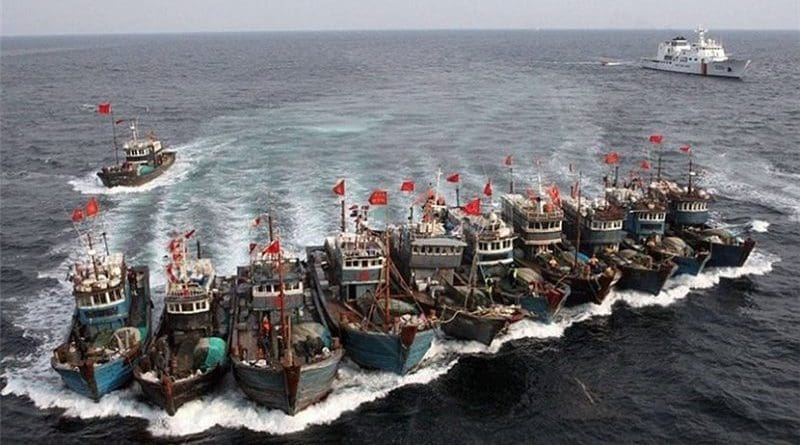Indonesia: Activists Welcome US Sanctions On Chinese Fishing Boats Over Labor Abuse
By BenarNews
By Pizaro Gozali Idrus
Rights activists in Indonesia have welcomed Washington’s sanctions of Chinese companies accused of illicit fishing and labor abuses, which according to the most recent data allegedly caused most of the 40 Indonesian workers’ deaths over the last three years.
Anis Hidayah, commissioner of the National Human Rights Commission, said she hoped Washington’s action would spur the Indonesian government to exercise stricter supervision over contracts of workers on foreign ships.
“The sanctions imposed by the U.S. on foreign ships can actually have a deterrent effect,” Anis told BenarNews.
On Friday, a day ahead of Human Rights Day, the United States issued sanctions against dozens of entities and individuals accused of rights abuses, including Tibet’s chief of police and a Filipino pastor accused of raping children, in addition to the Chinese fishing vessels.
The Global Magnitsky Act sanctions issued by the Treasury Department block those named from using the U.S. financial system and bans American citizens from doing business with them.
Friday’s sanctions by the U.S. Department of the Treasury targeted two individuals, Li Zhenyu and Xinrong Zhuo, along with companies they control: Dalian Ocean Fishing Co. Ltd.; the U.S. Nasdaq-listed Pingtan Marine Enterprise Ltd.; and eight other entities. Additionally, Washington identified 157 People’s Republic of China flagged fishing vessels in which these entities have an interest.
Rizky Fauzan Alvian, a former Indonesian crew member who has worked on the Chinese fishing boat Long Xing 629 owned by Dalian Ocean Fishing Co., said the sanctions were adequate punishment.
“In my opinion [the sanctions] are worth it, if you really want to do business … take care of it from the upstream,” Rizky, who worked from on Long Xing 629 in 2019 and 2020, told BenarNews.
In May 2020, Foreign Minister Retno Marsudi said four Indonesian crew membersdied on Long Xing 629.
Two of the crewmen died on the boat in December 2019, one in a South Korean hospital on April 27, 2020, and one, who was transferred to another boat, in March 2020 before it could reach port, she said.
The U.S. Treasury’s statement said five crewmembers died aboard the Long Xing 629 during 13 months at sea in 2019 and 2020. It did not mention the nationality of the victims.
“After 13 months without a port visit, with average workdays lasting 18 hours and living off expired food and brown desalinated seawater, five crewmembers had died. … The bodies of three crewmembers who died at sea were dumped into the ocean rather than repatriated home, “ the Treasury said.
“Subsequent investigation found that similar abuses occurred across DOF’s fleet, with widespread reports of physical assault, malnutrition, overwork, withheld pay and five more crewmember deaths,” it said, using an acronym for Dalian Ocean Fishing.
More than 9,400 Indonesian crew members were working on foreign ships, according to 2020 data from the Foreign Ministry.
Anis, the National Human Rights Commission chief, said he hoped the Indonesian government could take action in line with the U.S. sanctions, starting with strengthening the Manpower Ministry.
He said the regulations of foreign crew members’ management overlapped among three ministries – Manpower, Transportation and Maritime Affairs and Investment.
“This is actually a Manpower [Ministry] issue,” Anis said.
‘Acts of violence’
Meanwhile, Jakarta-based NGO Destructive Fishing Watch (DFW) Coordinator Abdi Sufuhan called the U.S. sanctions a bold move.
“This action will at least stop the practice of human trafficking and fishing by irresponsible business groups,” Abdi told BenarNews.
According to the NGO’s latest data, 40 Indonesian crew members died on foreign fishing vessels from November 2019 to March 2022. About 84 percent of the deaths occurred on Chinese and 14 percent on Taiwanese ships, Aldi said.
He also said the National Fishers Center received 93 complaints from 283 Indonesian and migrant crew members from November 2019 to November 2022. The top complaint was non-payment of salaries and/or 50 percent deduction of wages.
“As a result of the practices carried out by Chinese ships, Indonesian crew members experienced acts of violence, some were beaten, some received poor facilities and the impact was that some were sick, died and some survived,” Abdi said.
He said the Indonesian government needed to anticipate the implications arising from the U.S. sanctions.
“It is not impossible that there will be a cessation of operations and our crews are still there. It’s a good thing if they are in a transit country or in a country that is not currently sailing, but if they are on the high seas it will be troubling for them,” Abdi said.
He urged the Indonesian government to hold meetings, especially with companies that sent Indonesians to foreign ships, to record how many crew members could be affected by the U.S. action.

